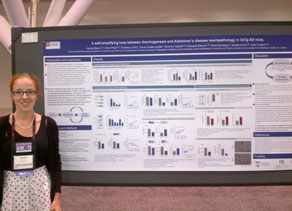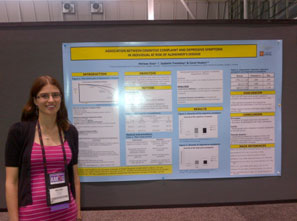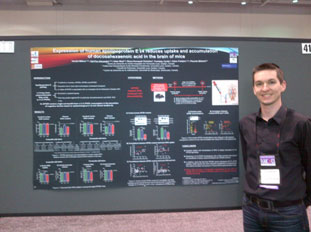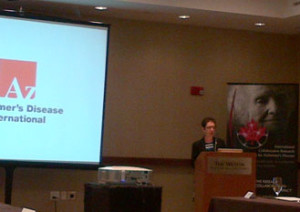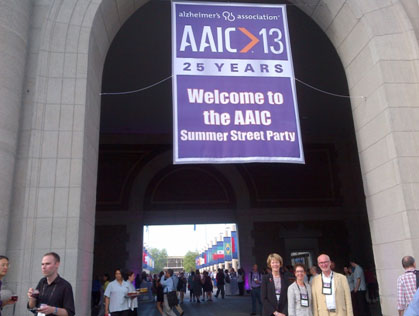
Canadian researchers at the 2013 AAIC conference
Purple flags graced the warm and sunny streets of Boston this past July, leading to the Boston Convention and Exhibition Center which welcomed 5000 men and women who traveled from over 70 countries around the globe, to attend the 2013 Alzheimer Association International Conference (AAIC). This year the AAIC celebrated 25 years of progress, change and discovery since its first conference in 1988, and hosted the largest gathering of Alzheimer’s disease (AD), dementia and neuroscience scientists in the world.

From July 13 – 18, 2013 hundreds of brilliant minds congregated into 5 plenary sessions, 8 symposiums, 152 oral sessions and nearly 1500 poster presentations.
Each oral session involved a panel of 6 researchers ranging from undergraduate students to established experts in the field, who each had 10 minutes to speak about their research findings.
A Question and Answer period followed which engaged the audience and sparked insightful comments shared between those who dedicate their lives towards the advancement of dementia science as well as those committed to the profession of care.
Among these sessions, were 16 Canadian researchers which included the following:
- A presentation from world- renowned expert in geriatric medicine, Kenneth Rockwood, from Dalhousie University, Halifax, Nova Scotia who spoke about how the clinically relevant changes within the AD assessment scale can be translated into changes in daily functions.
- Julie Robillard, a Post-Doctoral Fellow from the University of British Columbia shared her findings on the scientific validity and ethics of online tests for AD.
- Krista Lanctôt, a pharmacologist and neuroscientist from the Sunnybrook Research Institute in Toronto, Ontario presented on the use of visual attention in detecting apathy in AD.
- An ASRP Biomedical Doctoral Awardee Daniel Felsky from the Centre of Addiction and Mental Health in Toronto, Ontario, eloquently shared his findings on the Effects of the SORL1 Alzheimer’s Risk Gene Across the Human Lifespan.
- An impressive presentation was also delivered by a second year, undergraduate student Cassandra Anor from the University of Toronto, who shared findings on the comparison of neuropsychiatric symptoms in patients with AD and vascular dementia.
Throughout the week, the main exhibit hall was lined with over 100 booths from research funders including CIHR and the Alzheimer Association to pharmaceutical companies like Novartis Pharma AG, who had a booth that included a delightful barista who served hot cappuccino and scrumptious chocolate chip cookies daily.
Poster presentations also occurred in this space, and each day over 300 international researchers shared their findings through posters which were affixed to portable walls that had been set up throughout the exhibition hall. This evoked intriguing discussion related to the groundbreaking ideas and theories that were being shared.
Among these presenters were 75 Canadians which included:
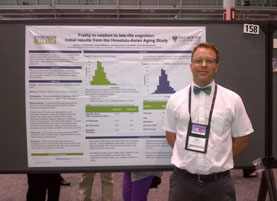 An Alzheimer Society Research Program (ASRP), Quality of Life, Post-Doctoral Awardee, Joshua Armstrong from Dalhousie University in Halifax, Nova Scotia, who looked at the relationship between frailty and cognition in older Japanese American men, using data that has been collected in the Honolulu-Asian Aging Study.
An Alzheimer Society Research Program (ASRP), Quality of Life, Post-Doctoral Awardee, Joshua Armstrong from Dalhousie University in Halifax, Nova Scotia, who looked at the relationship between frailty and cognition in older Japanese American men, using data that has been collected in the Honolulu-Asian Aging Study.
Vandal Milene from the University of Laval in Quebec City, Quebec, presented her researched which was supported by the ASRP. Her project looks at how older age may lead to deficits in thermoregulation which may accelerate the progression of AD and likewise considered the parallel affect of AD progression contributing to the body’s inability to regulate its temperature.
Melissa Dion an ASRP Quality of Life, Doctoral Awardee from the University of Laval in Quebec City, Quebec, presented on the association between subjective cognitive decline and depressive symptoms in individuals who are at risk developing AD.
Alexandre Dal-Pan an ASRP Biomedical, Post-Doctoral Fellow from the University of Laval , Quebec City, Quebec, presented on his study which provided a mechanistic explanation for the lack of benefit of n-3 long chain polyunsaturated fatty acid in APOE4 carriers on cognitive function and the risk of AD.
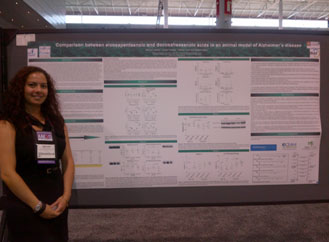 Meryam Lebbadi from the University of Laval,Quebec City, Quebec, presented on a project funded by the ASRP, which looked at a comparison between eicosapentaenoic and docosahexaenoic acids in an animal model of AD.
Meryam Lebbadi from the University of Laval,Quebec City, Quebec, presented on a project funded by the ASRP, which looked at a comparison between eicosapentaenoic and docosahexaenoic acids in an animal model of AD.
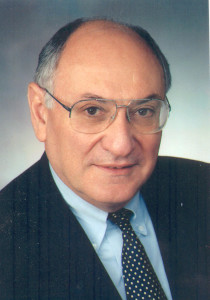
In addition to these presentations we had the privilege of participating in the International Alzheimer Disease Research Funder Consortium Meeting which included a presentation from Dr. Zaven Khachaturian, a neuroscientist and pioneer in Alzheimer’s disease research, also known as the Father of Alzheimer’s Research in the US. Dr. Khachaturian provided an inspirational presentation on the need to promote policies that will improve economic and social well-being internationally, as it relates to Alzheimer Disease.
We also attended the International Research Teams of the CIHR International Collaborative Research Strategy for Alzheimer’s disease where we listened to extraordinary updates from the various groups. Our CEO, Mimi Lowi-Young also presented on Future International Activities related to Alzheimer Disease International
In collaboration with CIHR, ASC co-hosted the Reception for Canadian Researchers and international Partners which engaged participants in rich dialogue involving AD and dementia research.
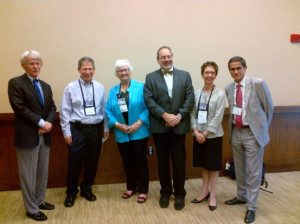
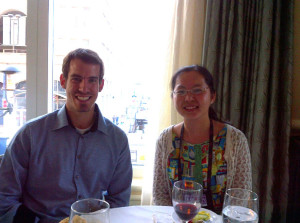
ASC also co-hosted the Early Career Research Reception with the Alzheimer Association, CIHR, NIA and NIH. This reception provided an opportunity for students and young investigators to learn more about funding opportunities that are available and to network with other researchers.
Attending the Early Career Research Reception were ASRP Doctoral Award recipient Daniel Felsky from the Centre of Addiction and Mental Health, Toronto, Ontario and Post-Doctoral Award recipient Chenjie Xia, from McGill University, Montreal, Quebec
Today the number of people living with Alzheimer Disease in the US is 5.2 million, and in Canada it is 747,000. Despite the alarming statistics associated with this degenerative disease, the revolutionary research that is being conducted by the thousands of dedicated individuals who commit their lives to providing a better future for people impacted by the disease brings hope. After meeting with, and listening to the brilliant researchers who are passionate about their investigations and are striving to achieve breakthroughs in their work, even at the most microscopic level, makes me believe that our dream for a future without Alzheimer Disease…will certainly become a reality.
Research Program Director
Alzheimer Society of Canada
